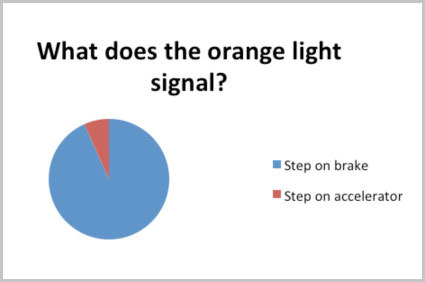Is orange the new green?
July 12, 2012 (PRLEAP.COM) Business News
The rule of thumb when it comes to the orange light is "STOP, if you can do so safely". But in reality, do drivers follow this rule? Allianz car insurance conducted a 10 second survey to find out.Of the 1092 drivers who responded to the survey, only 6.7% thought that an orange light - sometimes also called the yellow light - signaled that they should step on the accelerator. Luckily for road users and pedestrians, 93.3% (1019) of the respondents indicated that the orange light was a warning that they should stop. Of this large majority, 88% (906) of those who said it was a warning to stop matched the road rules exactly - they answered that it meant 'stop, if it is safe to do so'.
Australians know their road rules
Drivers that took part in the survey revealed that they are on the ball when it comes to recalling their highway code, with 82.9% of all participants selecting the Department of Transport's rule to 'Stop, if it is safe to do so' as their answer. Interestingly, the second and third most popular responses were 'Stop! I'll never go through an orange light and will break immediately' (selected by 8.3% of participants) and 'Step on it! An orange light means hit the accelerator to beat the red light' (4.6%).
Those surveyed shied away from answers which were circumstantial such as 'Stop unless I am late' or 'Step on it, unless my kids are in the car', and only 1 in 50 (21) of the surveyed drivers answered that they would 'Stop unless they were late'. And while other studies suggest that women may be better at multi-tasking and parking than men, it appears that gender plays no part in excellence in this category.
Why stop at an orange light?
The survey results point out that we are all generally well aware of the road rules but whether we follow the rules is another matter. While people may know what is expected of them when they approach an orange traffic light, in reality they may slam their foot on the brakes or speed up to get through the intersection instead. Either of these actions can result in a collision and running an orange light can result in the offender facing fines or demerit points. Intersection crashes can be particularly destructive because they often involve one vehicle crashing into the relatively unprotected side of another. If the collision happens at speed, the chance of damage and injury is multiplied - a crash at 70km/h has four times the casualty risk of a crash at 60km/h.
Better to be safe than sorry
Even though the official guidelines are to 'Stop, if safe to do so', collisions at intersections do happen. If you are driving on the roads, you will need to have car insurance so that you are financially protected for damage to your vehicle or third-party property in the event of an accident. For a quote for comprehensive car insurance, contact Allianz today.
